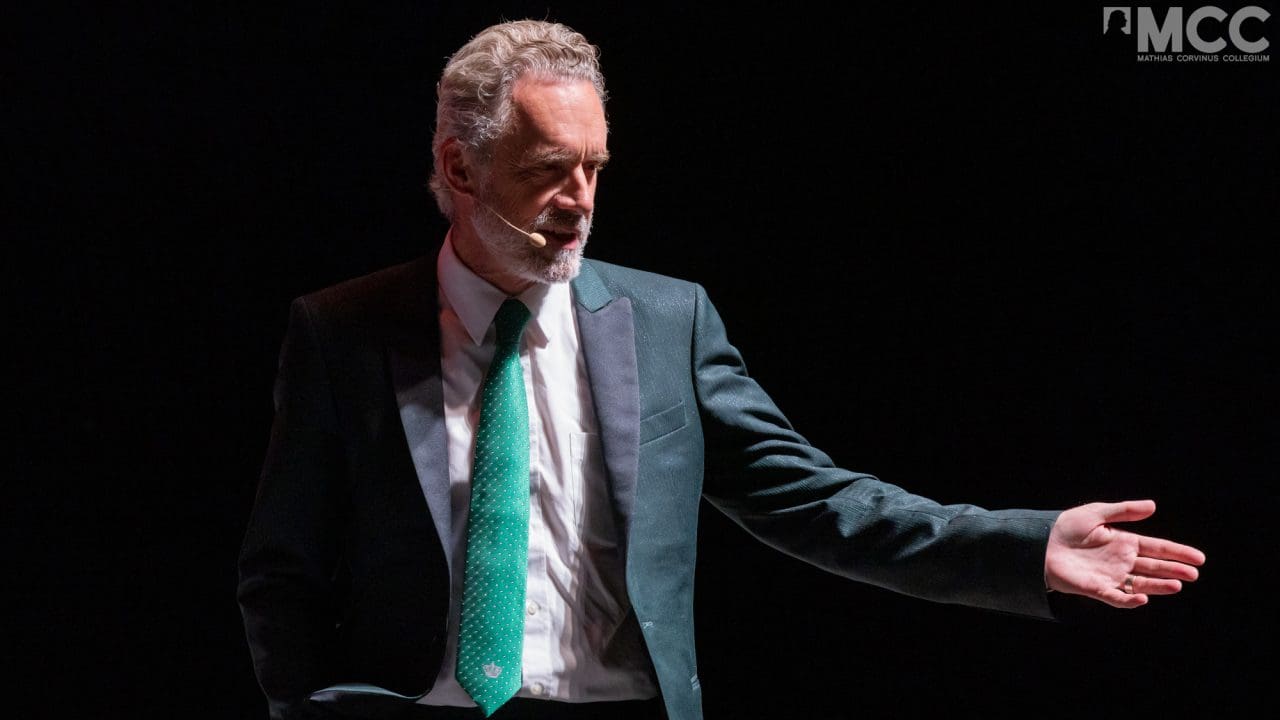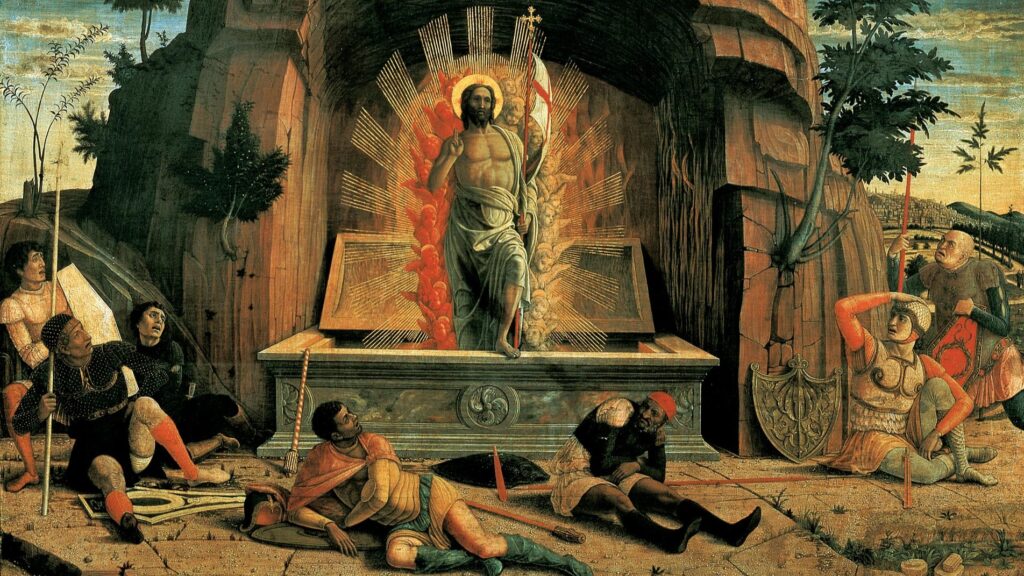Dr Jordan B. Peterson, the renowned Canadian clinical psychologist and best-selling author, visited Budapest on 9 May as part of his ‘Beyond Order: 12 More Rules for Life Tour’. Following the success of his sold-out event in June 2022, he delivered a captivating 2-hour lecture to a full house at the Papp László Budapest Arena.
The famous clinical psychologist was introduced by the American conservative political commentator and host of The Rubin Report, Dave Rubin, who was in Budapest to speak at the Danube Institute’s event one day before Dr Peterson’s show. Rubin had previously toured with Dr Peterson from 2018 to 2019, during which they performed 120 shows together. Rubin shared a touching story that occurred after one of their shows in Ireland in 2019. As they were walking back to their hotel, they were approached by a 60-year-old father and his 25-year-old son. They were in tears as they shared with Dr Peterson how they had been estranged for five years, but after reading his first book and attending his lecture, they were able to reconnect and reconcile their relationship. Rubin recalled this story as a testament to the profound impact Dr Peterson’s books, lectures, ad discussions can have on people’s lives.

During his tour, Dr Peterson is accompanied by his wife, Tammy Peterson, who delivers 10-minute welcome speeches and moderates the Q&A discussions. In her remarks in Budapest, she shared her personal experience of being diagnosed with fatal kidney cancer in the fall of 2018 and how God miraculously healed her, according to her testimony.
Everyone Sees the World Through a Story
In his lecture at the Papp László Budapest Arena, Dr Peterson drew inspiration from his upcoming book We Who Wrestle with God. The renowned clinical psychologist explained that the title was influenced by the realisation that the name of Israel, God’s chosen people, means ‘we who wrestle with God’. He emphasised that this applies not only to the Jewish people but to everyone, including atheists who wrestle with the concept of God when they try to deny his existence.
The main thought of Dr Peterson’s lecture was based on, as he phrased, ‘the most profound discovery of the last 60 years that is tearing up our culture today’: that people require an ethic to perceive and act, and on the postmodern realisation that ‘everyone sees the world through a story’. He argued against the view of material atheists, who believe that the world is solely based on facts from which you can derive the knowledge that orients you in the world by pointing out that there are an infinite number of facts and we need an ethic to prioritise how we deal with the facts. Dr Peterson defined ethics as the structure of values which we have to use to be able to prioritise our perceptions and actions. He explained that when we prioritise our actions, we select one thing to be superior above the other infinite things we could do. Therefore, he summarised, the world we inhabit
is an interplay between the endless array of facts and the ethic we lay on that infinite reality.
Dr Peterson gave an example of how stories influence our perception of the world. He explained when we watch a movie, we tend to identify with the hero, and by observing their goals, we adopt their perspective and experience their emotions as our own, which can update the structure through which we look at the world. Dr Peterson suggested that if we feel that the world is not fostering our desire to be alive and thrive, we may need to examine the story we see the world through. He explained that if the structure of our worldview is flawed, we can repair it by identifying what is wrong and prioritising the proper things. He also highlighted that we live in a morally relativistic and complicated world where there isn’t one genuine ethic but a hundred thousand different ethics, and the notion that there are right things is being dismissed as something naïve and unsophisticated. However, he drew attention to the fact that even though there is a wide range of actions, choices and pathways we can live our life by,
that doesn’t mean that every single path is of equal value.
The Importance of Unified Ethics
According to Dr Peterson, having a unified ethic in our relationships is crucial if we don’t want to experience anxiety. He explained that people often feel anxious due to having too many choices; therefore, he suggested that if we want to come out of anxiety, we have to unite all the disparate impulses that might guide us into a single pathway and walk down that pathway. He also noted that people experience positive emotions when they see themselves moving towards a value goal successfully; therefore, to avoid anxiety, they have to have unified goals with the persons they live with.
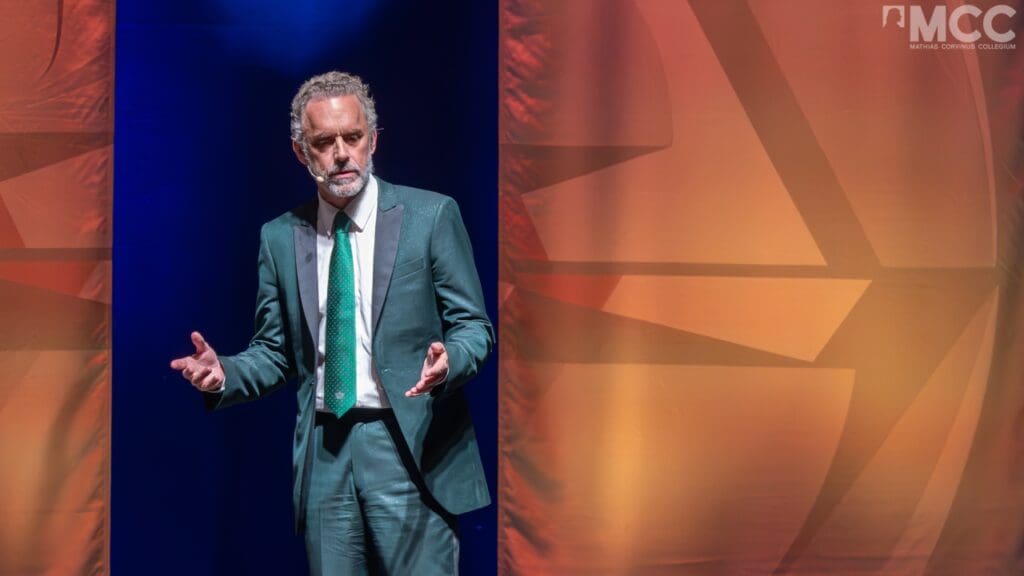
He emphasised that we also have to have a unified ethos in our marriages in which the two partners voluntarily align themselves with each other and have a shared goal that they both agree on, which is a better goal than what they could achieve individually. He added that it’s essential to create a harmony of vision within our families and our local communities, which can be harmoniously integrated with the larger State community, which is the complex ethos that unites us as individuals, protects us from anxiety, gives us hope, and connects us with others in a growing hierarchy. He explained that it’s important that everyone be willing to participate in this effort voluntarily.
Dr Peterson explained that although postmodernists recognise that individuals view the world through a story, they arrive at a misguided Marxist conclusion about the narrative through which we should view our world. He summarised the Marxist story as the proposition that humans arrange their social interactions based on power and dominance in the economic sphere as a consequence of economic competition; therefore, history is an eternal battleground between those who have and those who don’t have. He added that Marxists further claim that those who possess power have it because they took it from those who don’t. Dr Peterson explained that postmodern neo-Marxists generalised this narrative and applied it to all spheres of human interaction, such as race, sex, gender, ethnicity, etc., and stated that all of these relationships are based on power and are predicated on the oppression and the oppressor. Dr Peterson warns about the serious problems caused by these ideas. He pointed out that neo-Marxist ideas justify the use of power in relationships, and radical neo-Marxists even claim that the Western attempt to generate the presumption that men and women of goodwill can negotiate towards a mutually desirable end is nothing but a rationalisation of the people in power which allows them to maintain their grip on power. Dr Peterson also highlighted that postmodern Marxist rhetoric is dominant in academies and universities, which is dangerous as they even claim that Europeans invented the notion of free speech to justify their power to themselves with an elaborate ethical charade. He highlighted that universities are becoming less tolerant of certain opinions not because they don’t want to hear other viewpoints but because the idea of competing alternative opinions based on power is false, as there is nothing but power. He added that the problem with the neo-Marxist argument is that although the story of power is easy to understand, it’s not something we can apply to every aspect of our lives. He gave the simple example that marriage can’t be successful if it’s based on power, as the maximum people could achieve if they dominate their partners
is to live with a resentful slave.
He then phrased the counterargument of the neo-Marxist belief by stating that each person has an intrinsic and transcendent value regardless of their power, and this nature of the element of the human being that provides us with infinite worth is the purpose of the religious endeavour.
We Who Wrestle with God
Dr Peterson highlighted that if we see the world through a story, then the Bible, the biblical corpus is a fundamental story, and it is not required to believe in God to accept the psychological advice or messages of the Bible. To showcase four different characters or spirits of God, he first described the story of Cain and Abel. Speaking about the first pair of siblings, he highlighted that there are times in our lives when we experience that we don’t receive an answer to our sacrifice, or that the response to our sacrifice is rejection. He described Cain as the prime example of that violent, bitter, arrogant personality and philosophy that blames God and the natural order he created for his own wrong decisions and poor-quality sacrifices. Dr Peterson explained that as opposed to that, Abel’s sacrifice was of high quality, as he had the ‘proper spirit of acceptable sacrifice’ and offered his best to God, which was accepted. In contrast, Cain’s sacrifice was not of the same quality and was not accepted. Dr Peterson detected God’s spirit in this story as ‘the spirit that calls Cain out on the inadequacy of his sacrifices’ and tells Cain that he engages in a ‘creative intercourse’ with the spirit of sin, which is driven by his bitterness about the fact that his sacrifices have gone unrewarded. He noted that Cain became so deeply misguided by sin that he killed his own ideal, his brother Abel, who he really wanted to be. Another conclusion Dr Peterson derived from this story was that the postmodernist Marxists eliminate all ideals by referring to the ‘economic power games’ which constantly create social relations, and this is precisely what leads to the real disaster.
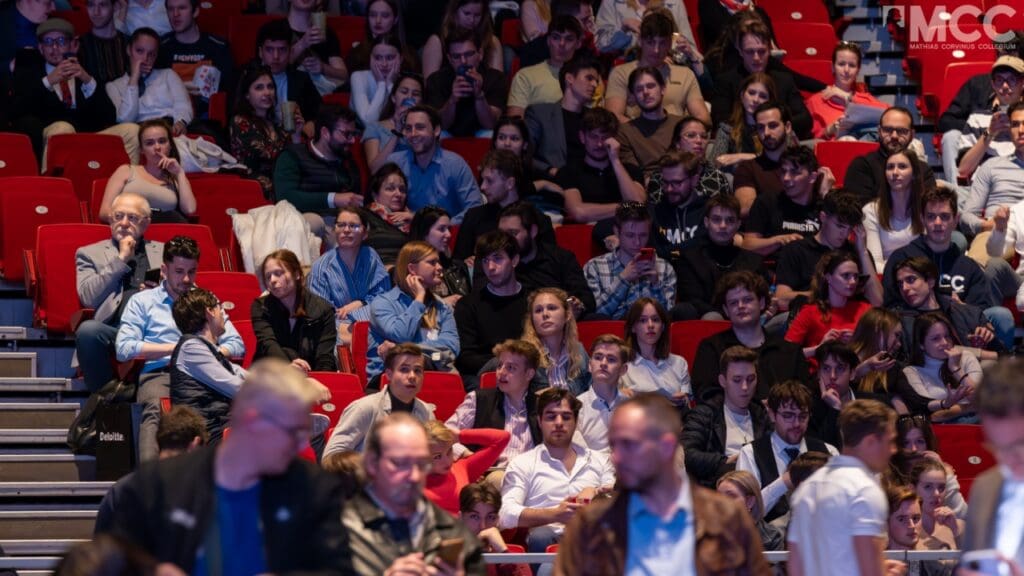
As the second biblical story, Dr Peterson spoke about the story of Noah in which he detected the second spirit that ‘inspires the wise to prepare for times of trouble,’ which is why Noah, driven by faith, built the ark before the flood and his family was saved, and the earth was repopulated.
As the third biblical story, the clinical psychologist recalled the story of Babel, in which Babylonians built a technological marvel, a tower which they believed could reach heaven and replace God, which, as he pointed out, is the typical totalitarian enterprise. In this story, Dr Peterson named God’s third character or spirit as ‘the transcendent reality that destroyed the arrogant totalitarian enterprise and punished the presumptuous technologists.’ He drew attention to the fact that people don’t have to believe in God to believe that
the spirit that is good in the fundamental sense is the spirit that punishes the presumptuous tyrant.
Finally, Dr Peterson detected the fourth spirit of God as the spirit that ‘calls even the unwilling to adventure’ with the story of Abraham, who was called out from his parent’s house and his comfortable idleness by God to make him a father.
Dr Peterson also reminded his audience of how God called upon Moses to put an end to slavery and tyranny. He emphasised that God appeared again in this story as a spirit that opposes oppression. He also reflected on his recent findings about the story of Jonah, which, as he described, is often the story that is used by ‘Luciferian intellectuals’ to discredit the Bible. Dr Peterson explained that if we’re called to stand up against tyranny like Jonah or our conscience prompts us to stand up against an authority and we don’t do it, then we aren’t yielding to the call of the good spirit–that is the spirit of God which appears in the stories of Cain, Abraham and Moses–and even if we are disobeying because we want to be safe, we will in fact put our lives in danger as a consequence. He stressed that Jonah’s story shows that you pay a price for telling the truth, but an even higher price for not telling it.
As a closing thought of his lecture, Dr Peterson explained that a central unifying spirit connects the biblical stories, and we have to get into a proper relationship and alliance with this spirit, and then it will carry us through even the most horrible situations. He highlighted that the complete realisation and fulfilment of this can be seen in the New Testament. Dr Peterson reminded the audience that the image of Christ hanging on the cross that people have been looking at for 2000 years is an image of undeserved tragedy and suffering of the most innocent who went through the worst. He stated: ‘This is how the resurrection is contrasted with the crucifixion, and this is also the elaboration of the spirit of Abel and the antithesis of the spirit of power.’
‘There is No Alternative to the Hungarian Family Model’
After his lecture, the famous psychologist answered some of the more than 600 questions he got from the audience. To the question regarding his opinion about the traditional family values that the Orbán government advocates, he encouraged Hungary to continue its commitment to maintaining its fight for traditional values and stated: ‘There is currently no alternative to the family model represented by the Orbán government, since apart from these most basic ideals there are no other values on which a healthy society can be based, therefore it is extremely important to preserve the aforementioned ideals, because if we destroy these basic values, we will pay a heavy price and advanced civilisations know it well.’ He added: ‘Nowadays, unfortunately, many people do not even take it as a basic fact that a man and a woman should start a family and raise children. However, by erasing central values such as the family, not only the directly affected people and institutions will be harmed, but society as a whole as well.’
Hungarian Recognition of Jordan Peterson
As we reported in a recent Hungarian Conservative article, instead of rewarding and recognising him, his homeland, Canada, vilifies and threatens Dr Peterson with suspending his clinical licence if he won’t go under a ‘mandatory social-media communication retraining’. However, the Hungarian government and the people of Hungary gave him all the respect he deserves. During his 2019 visit to Budapest, Dr Peterson was received by Hungarian Prime Minister Viktor Orbán and during his previous 2022 visit, apart from his full house show at the Budapest Congress Centre, Dr Peterson also gave a lecture at the Sándor Palace, the official residence and offices of the President of Hungary, where he was awarded the civilian class of the Grand Cross of the Order of Merit of the Republic of Hungary by President of the Republic Katalin Novák. The Hungarian President of the Republic awarded Dr Peterson ‘in recognition of his outstanding scientific work in the field of clinical psychology, as well as his exceptionally dedicated and influential activities in defence of creative freedom and the education of youth.’
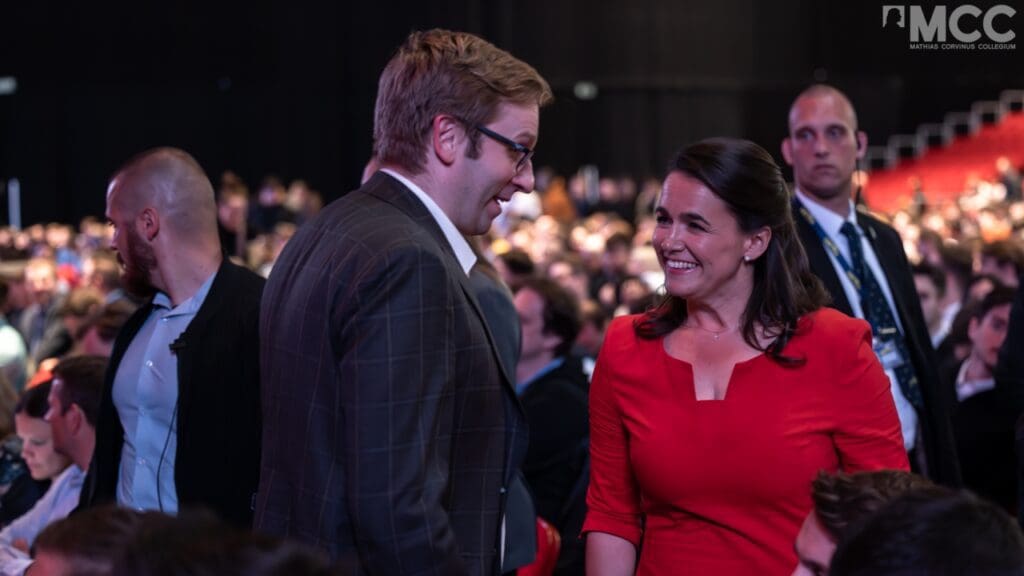
During his recent visit, Dr Peterson was again greeted by politicians of the Hungarian government and welcomed with a full house audience at his lecture. At the end of his presentation, Dr Peterson expressed his gratitude towards Hungary and promised to return in 2024 to speak more about his upcoming book.

